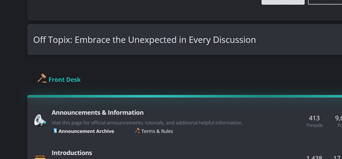I get the sentiment but I would not be so quick to wish ill on the people this will really affect, which is a much larger and much more numerous group than you might realise.
First up, WP’s demise would affect every user who just wants a small site to work, who does nothing more than install a theme and a couple of plugins and gets on with their day. They don’t care how the software works, they just want a simple and good enough solution - and the competition, hilariously, fails to understand what makes WP compelling to users.
It doesn’t matter if it’s the CMS in Woltlab, or it’s Drupal, Silverstripe, CraftCMS, etc, they all fail at getting the user in and creating content easily. Oh, don’t get me wrong, these platforms are powerful but to a first time user they’re flat out daunting, in a way WP never was. (The fact WP does less, overtly, out of the box is relevant here.)
I rather suspect a number of people in this boat would just give up rather than try to go through the hassle of finding an alternative. Which, like it or not, would be a loss to the world - the great joy of WP is that it gave just about anyone an on-ramp into making their own space to have their say.
But the road to alternatives is an interesting one. WooCommerce users will likely enrich Shopify first and foremost because Drupal Commerce is no competition. Those who truly, desperately, want their own self-hosted storefront will likely end up gravitating to Magento and, frankly, I’m not sure that’s better for the world. It’s certainly not safer, and it won’t be an improvement for their sanity assuming they even get it installed.
The road to a mature WP replacement that people will actually use is not 6 months away, not with any framework that currently exists (short of treating something like Craft as a framework), because it’s not just about the CMS core, it’s about the ecosystem. It’s about having a CMS that can do the things, whether core or plug-in, it’s about having the rich functionality achievable with WordPress today. It’s also about having the buy-in from people that the platform isn’t going away overnight, or that there won’t be another better one on 6 months. It’s about that there’s people having the willingness to invest in the platform and prove it is suitable for sites. WP, for better or worse, powers not only the hobbyist who just wants a little blog, it powers things like the official site of the US White House, it powers parts of the US gov’s online estate.
These people are not going to trust an upstart any time soon. The lead time for that sort of crowd to adopt a new platform is at minimum 5 years. That’s 5 years of runway a platform has to build to prove it’ll stand the test of time. Minimum.
And that’s before we even talk about the reputational damage being done here. Putting aside Matt’s ego, this whole drama damages all of us in the open source space. Because now this has happened, any project with any serious plans for adoption not only needs to prove itself in terms of legitimacy (which for corporate use has always been a tricky one as corps like to have someone they can beat over the head with respect to liability), but now they have to prove the project leadership won’t pull a Matt and screw around the user base. And it isn’t even going to be a case of “well we never did before”, Matt’s actions have spotlighted the shortcomings of the BDFL model that I’ve always seen as the only viable way for open source to function. (Anything beyond a BDFL or small team of decision makers inevitably descends into design by committee hell.)
Unless projects can actively demonstrate a leadership team and model that instils confidence, they have a problem with widespread adoption. You may be of the opinion that “so what if companies don’t use the product” - but a CMS more than any needs to demonstrate a willingness for users to use it. To be taken seriously it needs to be able to be suitable for enterprise use on some level even if not marketed to that user base.
Worse, Matt’s actions have demonstrated the risks of using commercialised GPL, in stealing and republishing a paid plugin. This has always been on the table as a risk - always - but Matt had always demonstrated before that he was willing to let the ecosystem exist because it was good for WP to have a premium ecosystem. It demonstrates that people are willing to invest in the platform, and to a point where they have skin in the game.
This, however, will make people think twice. It doesn’t matter about the nuance of the licence, being MIT or BSD to GPL, though: the entire “open source” movement is now tainted, and while it will recover, it’s not clear what damage this is going to be in the fullness of time.


